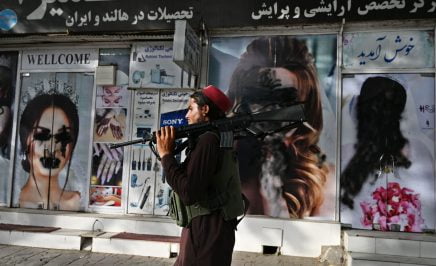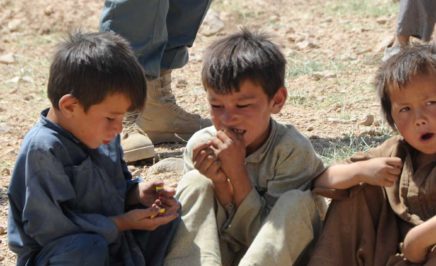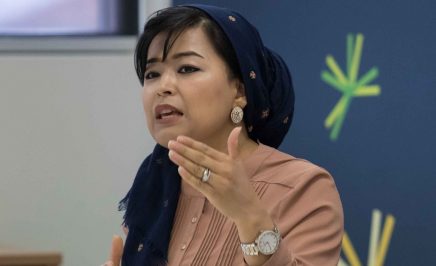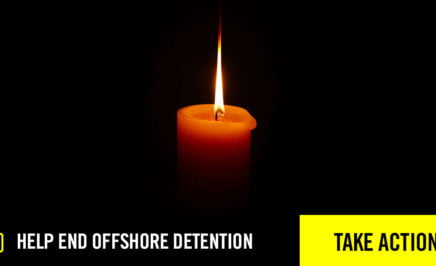While Australia has had a strong commitment to resettling refugees following the Second World War, it has always had concerns with refugees spontaneously arriving by boat. It could be argued however, that the single most important moment in the history of Australia’s response to refugee arrivals was the “Tampa affair”, marking the beginning of two decades of hardline policies that continues to this day.
On 26 August 2001, a Norwegian freight ship, The MV Tampa, rescued 433 refugees from a leaky fishing vessel 140km from Christmas Island. The refugees were mostly Afghans, fleeing the Taliban. When the captain of the ship attempted to enter Australian waters, after a lengthy standoff, he was refused entry, and instead the Australian government sent military SAS personnel to board the Tampa. It was the first time a boat, trying to enter Australia carrying refugees, had been met with this type of military force.
The “Pacific Solution”
The Prime Minister at the time, John Howard, capitalised on the Tampa affair to launch one of the most aggressive responses to refugee arrivals in the world. Boats carrying refugees, despite representing only a tiny fraction of refugee arrivals in Australia, became the target of military interventions under a newly launched operation and the government rushed through a suite of harsh new anti-refugee laws and policies that came to be known as “The Pacific Solution”.
From then on, no refugees arriving by boat would be allowed to enter Australia and would instead be held in offshore detention centres. Parts of Australia were excluded from the Migration Zone, meaning that those arriving on Christmas Island and other Australian territories in the Pacific were no longer under the jurisdiction of Australian immigration law, and could not apply for Australian visas. Other hardline elements of Australia’s border policy, such as boat turn backs, were also put in place.
At the time, while highly divisive, the decision to stop the Tampa was generally supported by the Australian public, with John Howard’s popularity significantly increasing and the hardline response from the government ultimately receiving support from then opposition leader Kim Beazley.
A couple of weeks later, the September 11 attacks in the United States boosted fears of terrorism across the western world and created an Islamophobic atmosphere hostile to foreigners, particularly those fleeing conflicts in the Middle East. Politicians in Australia were quick to use this fear to demonise those on the boats as a potential threat, rather than victims fleeing human rights abuses in need of a humanitarian response.
The “Children Overboard” affair
In one encounter with a boat carrying refugees, in which the boat sank, the Howard government falsely claimed that the refugees had deliberately thrown their own children overboard. This served to further demonise people seeking asylum and paint them as careless and cruel.
The incident came to be known as the “children overboard affair” and, even though it was found to never have happened, the false narrative pushed by the government helped to solidify their new hardline position on refugees and bolster popular support.
In November that year, the Howard government was re-elected with an increased majority, saying, “We will decide who comes to this country and the circumstances in which they come.” The week before the Tampa affair, John Howard was behind in the polls. Sadly, demonising refugees and more specifically boat arrivals had been successfully politicised and would return as a feature of future elections.
“Stop the boats”: the legacy of the Tampa affair two decades on
The Tampa affair and the events that followed changed Australian policy towards refugees forever. No longer did Australia treat people arriving by boat as genuine asylum seekers in need of protection, but instead treated them as “illegals”, “dangerous”, “possible terrorists”, “queue jumpers” and “criminals”. They could now be denied entry into Australia by whatever means necessary. From then on, the “ends justify the means”, no matter the financial costs to the taxpayers or the physical and mental costs to the men, women and children indefinitely detained.
In the two decades since, Australia’s refugee policy has been defined by a strong “stop the boats” stance which, despite a briefing softening of the policy from 2007 to 2011, has today become even more hardline than the policies introduced by John Howard. Policies such as offshore processing, boat turn backs, and indefinite detention all enjoying bi-partisan support.
The Tampa affair was the moment the Australian government decided to stop seeing refugees arriving by boat as people in need, and started seeing them through a military, security lens where border control trumps everything, including human rights and human decency.
Sadly, even today with a humanitarian crisis unfolding in Afghanistan, the Australian government can not talk about the tragedy there without first raising the spectre of boat arrivals and the need to maintain its hardline deterrence approach. While in Australia, Nauru and PNG have over 1000 people still trapped in limbo 8 years later, with no solution from the government in sight. After twenty years, the legacy of the Tampa affair is still all too real for these individuals.
What we can do to learn from the Tampa affair
Australia can, and must, do more so that those at grave risk and fleeing the Taliban in Afghanistan, including women and girls, and human rights defenders, are provided protection.
The Australian government should:
- Expand the humanitarian intake to include people fleeing the Taliban
- Grant permanent protection visas to all people from Afghanistan in Australia on temporary protection visas
- Reform the community sponsorship program so that people across Australia can welcome people seeking safety into their community
Together, we can make a difference by putting pressure on the Australian government to provide safe passage to people fleeing the Taliban. Please take urgent action now.
Amnesty works to support refugees and asylum seekers, including campaigning for the Australian government to end offshore detention and implement solutions that help more people find a safe place to live.
This crisis highlights how our work is challenging injustice and could save lives. Learn more about our Refugee Rights campaign here.





